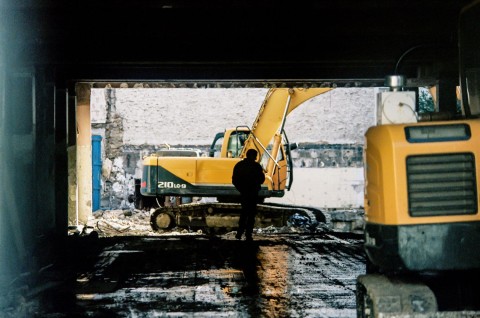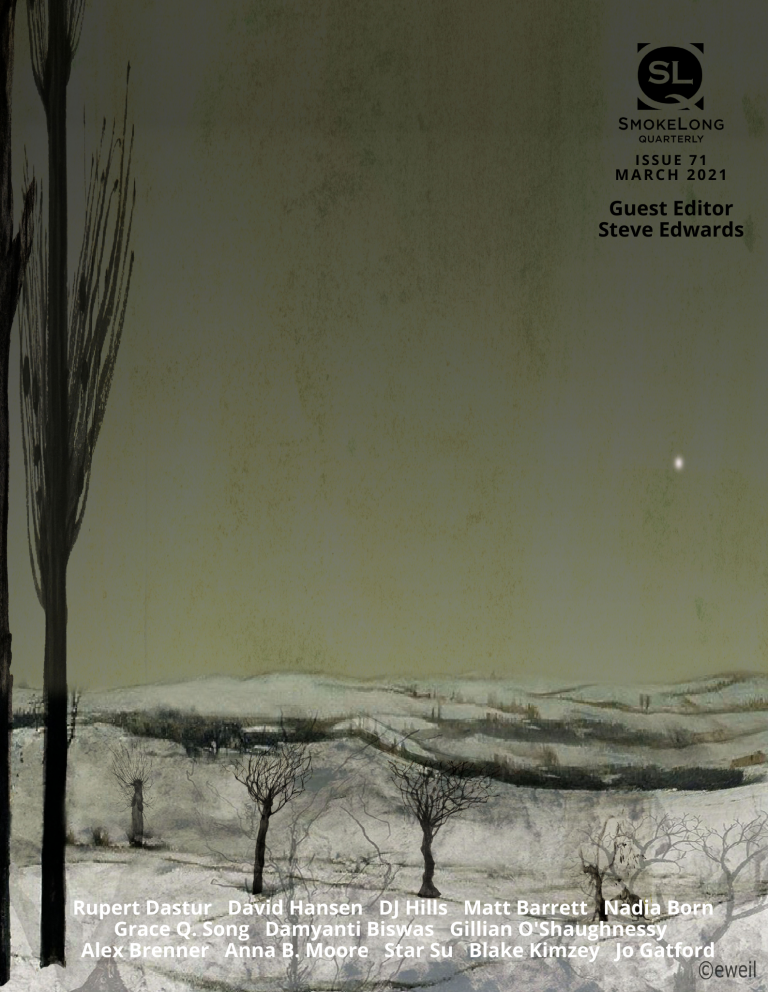A woman outside the post office said there’s no such thing as quiet anymore, which was true, or at least it was true here. Across the street, construction vehicles beeped and hauled dirt. Jackhammers dug into the ground like giant dental equipment, clanging against metal and rock. Over all that noise, the woman had to shout it. “THERE’S NO SUCH THING AS QUIET ANYMORE IS THERE!” I doubt she meant much by it. She’d turned to look at the construction, and our eyes just happened to meet. And maybe she’d said it because the noise was on her mind.
Or maybe she’d said it because it was better than what was really on her mind. How it had been two weeks since the military came to town and a few days since the mayor went missing and a handful of hours since the busses stopped running.
Or maybe she’d said it because it got her mind off whatever was in the box she held, addressed to someone in South Korea, in a town I could not pronounce.
“Gwangju,” I said. “Am I saying that right?”
“What?”
Or maybe she’d said it because we were still in line, and no one had opened the doors and we’d been here for an hour and it was starting to get hot.
“Is that how you say it?” I asked. “Gwangju.”
“That’s close.”
Between us and the construction, a deer carcass rotted in the street. A man in military gear strode past us through the parking lot.
“Do you know what they’re building over there?” the woman shouted.
I shook my head. A backhoe dug deep into the ground.
“Nothing.”
“Nothing?”
“They’re just turning the dirt over. That’s it, that’s all they do.”
She adjusted the box with one knee, pressing it to her chest.
“It used to be covered in lilies, remember?” she asked. “But those men dug up all the lilies and turned the earth over, and they’ve been doing it ever since.”
“Just turning it over?”
“Turning. It. Over.”
Beside the backhoe, three men in hard hats leaned against their shovels.
“I asked them once what they were doing. They said following orders, can you believe that? They show up each morning and someone says, do the same thing you did yesterday, even though it’s done, and they do it.”
“Doesn’t make much sense,” I said.
“Well, what does?”
I shrugged. A man at the front of the line banged his fists against the door. From above us, a child’s voice called for us to help. There were no other buildings here, just a window, floating, with clouds clearly visible through it, and a girl looking down from what might have been—if you can count stories on an invisible building—the twentieth floor.
Some people looked, some didn’t. Some noticed the girl and went back to their places in line.
“That’s Gwangju,” said the woman.
“You mean up there?”
“I have to get this to her.”
Slowly, the window drifted past us as the woman in line watched. When it disappeared, the construction stopped. Jackhammers stopped jackhammering. Backhoes shut their engines off. Even the men who leaned against their shovels laid them down and left.
“They do that every time the window comes.” The woman turned to face the front of the line, the box still in her hands. “I don’t think they want me to hear her.”
From behind me, I could feel the men watching us. When I looked, they carried bags of food, eating silently by their trucks. The clocks chimed ten am.
The manila envelope in my hands—it felt so light to me now, despite how heavy it weighed on my mind. I’d read the words a thousand times, my signature dragged like globs of glue on the bottom of every page, every phrase so serious and impersonal. The legality of divorce. When I closed my eyes and pictured my wife, the woman I’d married at twenty-five, I could hardly see her anymore. The bed we shared, the roof—these things drifted from me as in a cloudy dream. I couldn’t remember what brought me here, to this point, with these papers in my hand. To have signed every unforgiving page. Of all the places to find myself—could I have known I’d end up here?
“Why is it so quiet?” I asked, and the woman in line shouted, “It’s not!”
Behind us, construction vehicles beeped and hauled dirt. Jackhammers dug into the ground like giant dental equipment, clanging against metal and rock. We stepped forward in line, the woman adjusting her box with one knee.
Inside, an employee called me forward. He placed my envelope on a scale.
“Is this all for today?” he asked.
Above us, the sound of music, light and rhythmic, echoed through the ceiling.



 The core workshop of SmokeLong Fitness is all in writing, so you can take part from anywhere at anytime. We are excited about creating a supportive, consistent and structured environment for flash writers to work on their craft in a community. We are thrilled and proud to say that our workshop participants have won, placed, or been listed in every major flash competition. Community works.
The core workshop of SmokeLong Fitness is all in writing, so you can take part from anywhere at anytime. We are excited about creating a supportive, consistent and structured environment for flash writers to work on their craft in a community. We are thrilled and proud to say that our workshop participants have won, placed, or been listed in every major flash competition. Community works.